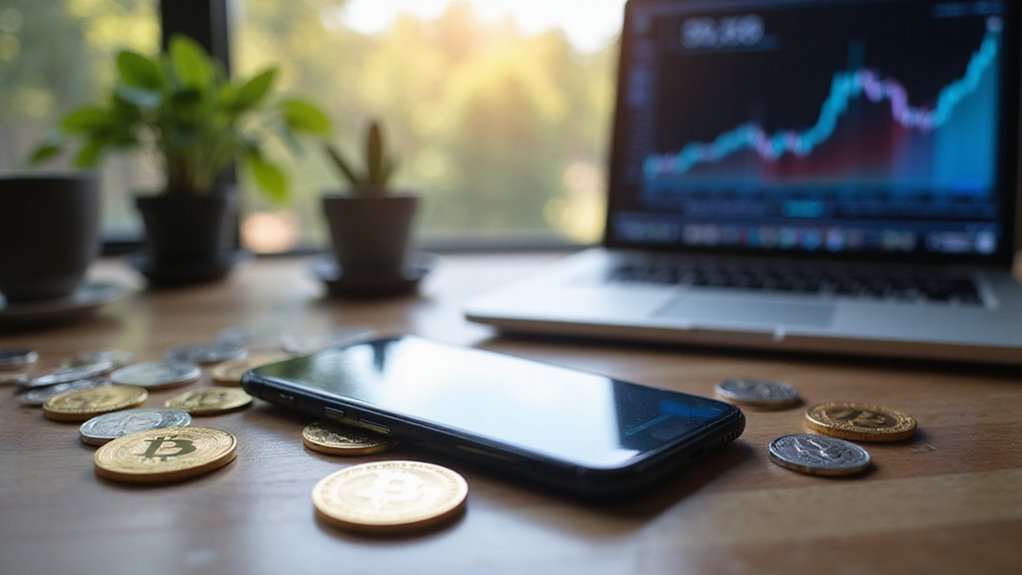Free cryptocurrency can be legitimately acquired through five proven methods. Cryptocurrency exchanges offer sign-up bonuses and rewards for minimal trading activity. Crypto faucets distribute small amounts for completing simple tasks or viewing ads. Airdrops scatter tokens to early supporters of emerging projects. Educational platforms implement “learn-to-earn” models, compensating users for completed courses. Referral programs enable passive accumulation through commission structures approaching 60% of trading fees. These incremental strategies, when strategically combined, form a compelling pathway to digital wealth accumulation.

Who hasn’t dreamed of acquiring cryptocurrency without the associated financial outlay?
While the notion may seem fantastical—akin to discovering a digital El Dorado—several legitimate pathways exist for the judicious crypto enthusiast to amass digital assets sans direct investment.
Cryptocurrency exchanges present perhaps the most straightforward opportunity, with numerous platforms offering sign-up bonuses and promotional incentives to entice new users.
Exchanges dangle digital carrots before newcomers, transforming registration into a potentially profitable first step into crypto waters.
These institutions periodically dispense tokens for completing rudimentary tasks or engaging in minimal trading activity.
Naturally, prudent selection remains paramount; one must verify an exchange’s security protocols and reputation before entrusting one’s personal information to their systems.
Popular options include Coinbase and Gemini, which have established track records of providing free crypto to new clients.
The humble crypto faucet—a mechanism designed to distribute minuscule quantities of digital currency in exchange for completing tasks or viewing advertisements—represents another avenue worth exploring.
Though individually modest in payout, these faucets (when utilized consistently within their daily limitations) can accumulate meaningful sums over time.
The diversity of cryptocurrencies available through these channels further enhances their utility.
Airdrops, the digital equivalent of monetary manna from heaven, occur when emerging projects distribute tokens to early supporters and community participants.
Vigilant monitoring of social media channels and crypto news outlets can position one advantageously to benefit from these distributions, which occasionally feature substantial prize pools.
These gifted tokens subsequently present potential trading opportunities.
Setting up a compatible wallet is essential for receiving airdropped tokens from blockchain projects looking to build their communities.
Educational platforms implementing “learn-to-earn” models offer intellectual stimulation alongside financial remuneration.
By completing courses, quizzes, or contributing knowledge to community discussions, participants receive cryptocurrency rewards—an arrangement beneficial both to one’s portfolio and understanding of blockchain technology.
Some platforms even provide opportunities to earn up to 6% APY by staking eligible cryptocurrencies like Tezos, Cosmos, and ETH.
Finally, referral programs present opportunities for passive accumulation, with some platforms offering commission rates approaching 60% of trading fees generated by referred users.
Such affiliate relationships, when strategically cultivated, can yield substantial returns without requiring significant time investment.
While none of these methods will likely catapult one to crypto-millionaire status overnight, they collectively represent legitimate strategies for building digital wealth incrementally—a cryptocurrency portfolio constructed not from financial investment, but from time, knowledge, and strategic engagement.
Frequently Asked Questions
Is Free Cryptocurrency Subject to Taxes?
Yes, free cryptocurrency is subject to taxation despite its misleading “free” descriptor.
The IRS classifies crypto acquired through airdrops, mining, or staking as ordinary income—taxable at regular rates (potentially up to 37%).
Additionally, subsequent trading or selling of this “free” crypto triggers capital gains tax obligations.
While transferring between personal wallets remains tax-free, the documentation burden persists.
The financial adage holds true: nothing, especially in cryptocurrency, is truly free from Uncle Sam’s reach.
What Security Risks Come With Free Crypto Offers?
Free crypto offers harbor a veritable minefield of security pitfalls: phishing schemes targeting private keys; malware-laden “mining” applications that harvest credentials rather than coins; fraudulent transactions masquerading as verification steps; and privacy compromises through excessive data collection.
Perhaps most insidious are the social engineering tactics—impersonation of legitimate projects and the creation of artificial FOMO—that exploit human psychology rather than technical vulnerabilities.
The adage “there’s no such thing as a free lunch” applies doubly in cryptocurrency’s wild frontier.
Can I Earn Substantial Amounts Through Free Cryptocurrency Methods?
Substantial earnings through “free” cryptocurrency methods remain largely illusory for most participants.
While airdrops occasionally deliver unexpected windfalls, and yield farming can generate meaningful returns, the latter requires capital investment (hardly qualifying as “free”).
Faucets and microtasks offer negligible compensation relative to time invested, while referral programs demand extensive networks to prove worthwhile.
The cryptocurrency ecosystem rarely distributes significant value without corresponding investment of capital, expertise, or substantial time commitment.
How Quickly Can I Withdraw Free Cryptocurrency Earnings?
Withdrawal timeframes for earned crypto vary dramatically by platform and token type.
Free earnings typically encounter the same standard processing times as purchased assets—ranging from minutes to 12+ hours.
The cryptocurrency’s blockchain confirmation requirements, network congestion, and exchange-specific security protocols all factor into this equation.
Users should note that minimum withdrawal thresholds (sometimes surprisingly high) may necessitate accumulating significant earnings before extraction becomes possible—a detail the “free crypto” evangelists conveniently omit from their pitches.
Are Free Cryptocurrency Platforms Available in All Countries?
No, free cryptocurrency platforms aren’t universally available across all countries.
Regulatory frameworks—varying from accommodating to downright hostile—create a patchwork of accessibility worldwide.
While decentralized exchanges like CroSwap offer broader reach (the beauty of blockchain’s borderless aspirations), centralized platforms such as Coinbase and Binance face significant geographical restrictions.
China and India, with their particularly stringent regulations, exemplify how national policies can effectively cordon off citizens from participating in what is, ironically, designed to be a global financial revolution.









